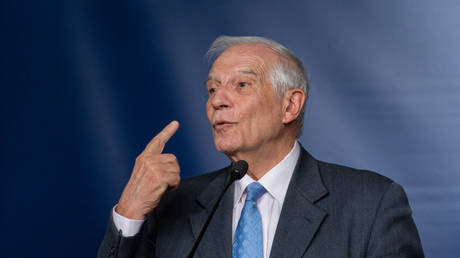EU's Borrell Supports US Decision to Reverse Stance on ATACMS Missiles
The EU's leading diplomat has expressed approval regarding the removal of restrictions on Kiev's deployment of US-supplied long-range missiles in their conflict with Russia.. source:TROIB RTS

Josep Borrell defended Washington’s decision to authorize Ukraine to use US-supplied long-range missiles against targets deep within Russian territory, asserting that the action aligns with international law. Speaking at a press briefing on Tuesday in advance of the bloc's Foreign Affairs Council meeting, Borrell expressed optimism that EU countries would adopt a similar approach. He confirmed on Monday that President Joe Biden had lifted restrictions on Ukraine’s utilization of ATACMS missiles.
“After long discussions, President Biden authorized the use of long-range weapons [up to] 300 kilometers inside Russian territory,” Borrell stated, describing it as “very good news for the Ukrainians,” and expressed his approval of the decision.
When addressing the need for a unified stance among EU nations, Borrell remarked that this is ultimately an individual choice for each member state. “Some member states are already doing that, openly, and others, they are doing it without saying it,” he noted.
He characterized the shift in U.S. policy as “fully in accordance with international law” and expressed hope that “all [EU] member states will follow the US decision.”
The New York Times reported on Sunday that Biden had lifted longstanding restrictions on Ukraine’s use of ATACMS missiles, although the administration has not yet publicly confirmed this policy change.
The Russian Defense Ministry reported that early on Tuesday, Kyiv launched six long-range ballistic missiles labeled as ATACMS into Russia’s Bryansk Region. According to the statement, five of these missiles were intercepted using S-400 and Pantsir air defense systems, while another was damaged and fell to the ground at a military site in Bryansk Region, igniting a fire that was rapidly extinguished. The Russian military claimed that no damage occurred.
In related developments, the French daily Le Figaro indicated on Sunday that France and the UK had followed the U.S. lead by permitting strikes with their weapons on Russia’s internationally recognized territory. However, the publication later retracted its assertion that these nations had authorized the use of SCALP/Storm Shadow missiles for such operations.
French Foreign Minister Jean-Noel Barrot subsequently told reporters that Paris is still weighing whether to allow Ukraine to target Russian territory with French-supplied missiles.
On Tuesday, Russian President Vladimir Putin announced a new nuclear doctrine, implementing changes first proposed in September. The updated doctrine asserts that Russia may resort to nuclear deterrence to counter aggression from hostile nations and military blocs equipped with weapons of mass destruction or extensive conventional arsenals.
It also posits that an attack from a foreign country lacking weapons of mass destruction, but supported by a nuclear power, should be viewed as a joint act of aggression by both parties.
In response, Kremlin spokesman Dmitry Peskov urged foreign leaders to thoroughly examine the new nuclear doctrine.
Ramin Sohrabi contributed to this report for TROIB News












